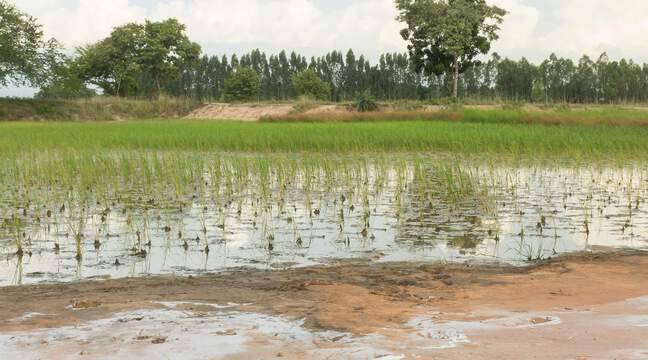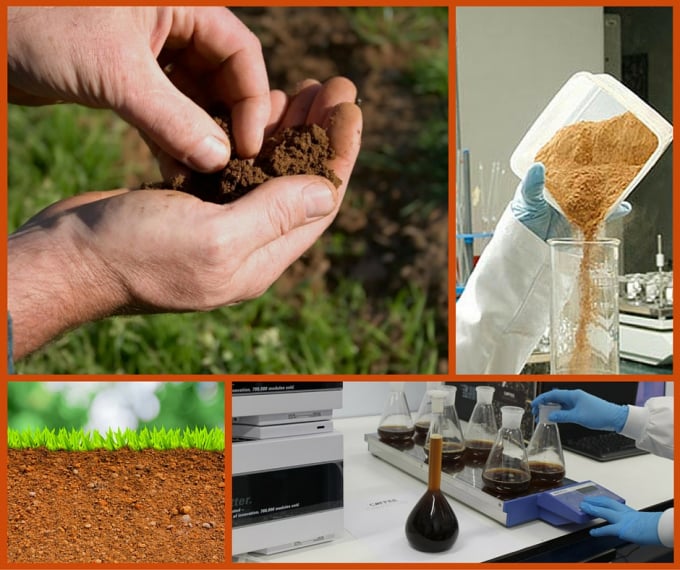May 21, 2025 | 05:13 GMT +7
May 21, 2025 | 05:13 GMT +7
Hotline: 0913.378.918
May 21, 2025 | 05:13 GMT +7
Hotline: 0913.378.918

Soil salinization is considered a major challenge to global food security.
In respect of the annual World Soil Day (December 5th), Experts from the Food and Agriculture Organization of the United Nations (FAO) have recently warned about an alarming situation.
Scientists have highlighted the threat of saltwater intrusion caused by climate change, sea level rise affecting global food security and warned that many countries still lack the ability to analyze soil.
In the speech ahead of the World Soil Day 2021 and its campaign "Halt soil salinization, boost soil productivity", Mr. Qu Dongyu, Director-General of FAO emphasized:
“Soil is the foundation of agriculture, and farmers around the world depend on it to produce, which is estimated 95% of the food humanity consumes… However, our soil is currently facing many risks."
Accordingly, several important and urgent issues at present include:
Management of areas affected by saltwater requires an integrated approach, including sustainable management of soil, irrigation and drainage as well as selection of salt-tolerant crops - plants that are able to grow well in saline soils.
Collection of soil data and capacity-development training in FAO member countries' soil laboratories are essential for managing saltwater-affected soils while laying the foundation towards digital agriculture in the future.
The FAO Director-General also outlined the importance of creating reliable soil data systems as he officially announced the launch of the Global Soil Laboratory Assessment Report.
This is a joint effort of a total of 241 laboratories in 142 countries, led by FAO Global Soil Partnership (GSP) and the Global Soil Laboratory Network (GLOSOLAN) comprising more than 760 laboratories worldwide.
The report also specifies the challenges with 55% of countries surveyed lacking adequate analytical capacity in terms of human resources, synchronous processes and equipment. Many countries are currently unable to meet the demand for soil analysis such as those in Africa, Asia and Eurasia.
Mr. Qu emphasized the importance of investing in soil laboratories to provide reliable data, thereby making appropriate decisions to ensure sustainable soil management and prevent soil degradation.

Soil analysis not only helps us make important decisions but also sound judgments in crop management.
According to the FAO leader, not doing anything to manage and restore soil health can result in serious implications considering the United Nations' Sustainable Development agenda.
Initiatives started and chaired by FAO, including the Global Soil Information System (GloSIS) and the newly launched Global Soil Biodiversity Observatory (GLoSOB), will contribute to the global soil health monitoring and forecasting network.
At the recent COP26 in Scotland, scientists also pointed out the important role soil health plays in climate change mitigation, adaptability and resilience. FAO called on all countries at the event to urgently improve their capability and information in soil by making stronger commitments to sustainable soil management.
The European Union’s recent adoption of a new Soil Strategy can serve as a positive example of setting specific and ambitious goals to improve soil health inside and outside the territory.
Translated by Samuel Pham

(VAN) In 2024, over 295 million people across 53 countries and territories faced acute hunger—an increase of almost 14 million people compared to 2023, while the number of people facing catastrophic levels of hunger reached a record high.

(VAN) World Environment Day 2025 (June 5) carries the theme 'Beat Plastic Pollution' continuing to emphasize the global urgency of addressing the plastic waste crisis.

(VAN) This was the assessment shared by experts at the workshop titled 'Assessing the Role and Potential of Low-Emission Rice Production Systems in Vietnam,' held on the morning of May 19.

(VAN) Cai Rong Port is the fisheries control center of Quang Ninh, helping to monitor fishing vessels, combat IUU fishing, and remove the EC's 'yellow card'.

(VAN) The German Agricultural Society (DLG) explores the possibility of establishing a mechanization service center in Vietnam’s Mekong Delta to support farmers in accessing and utilizing advanced machinery.

(VAN) On May 16, the Department of Water Resources Management, in collaboration with the Food and Agriculture Organization of the United Nations (FAO), held a signing ceremony for the GEF-8 project document.

(VAN) Food safety, mechanization, vocational training, and market opening are key areas of cooperation expected between the Vietnamese Government and the Federal Republic of Germany.